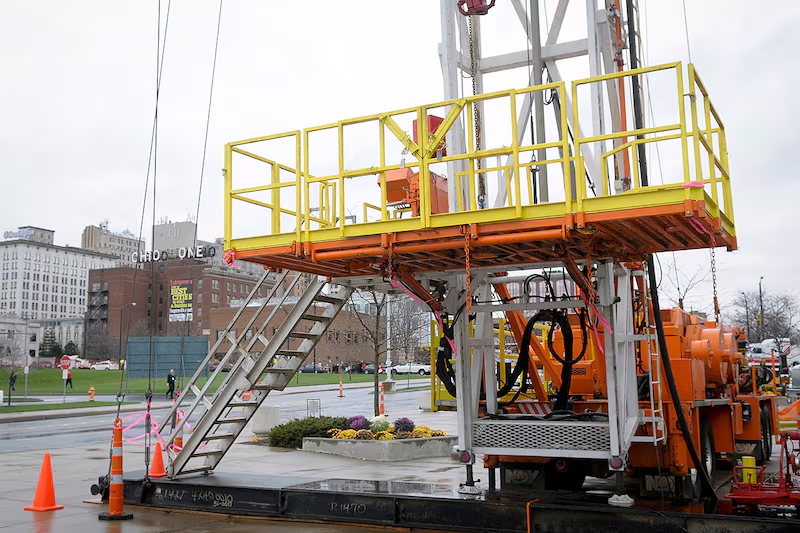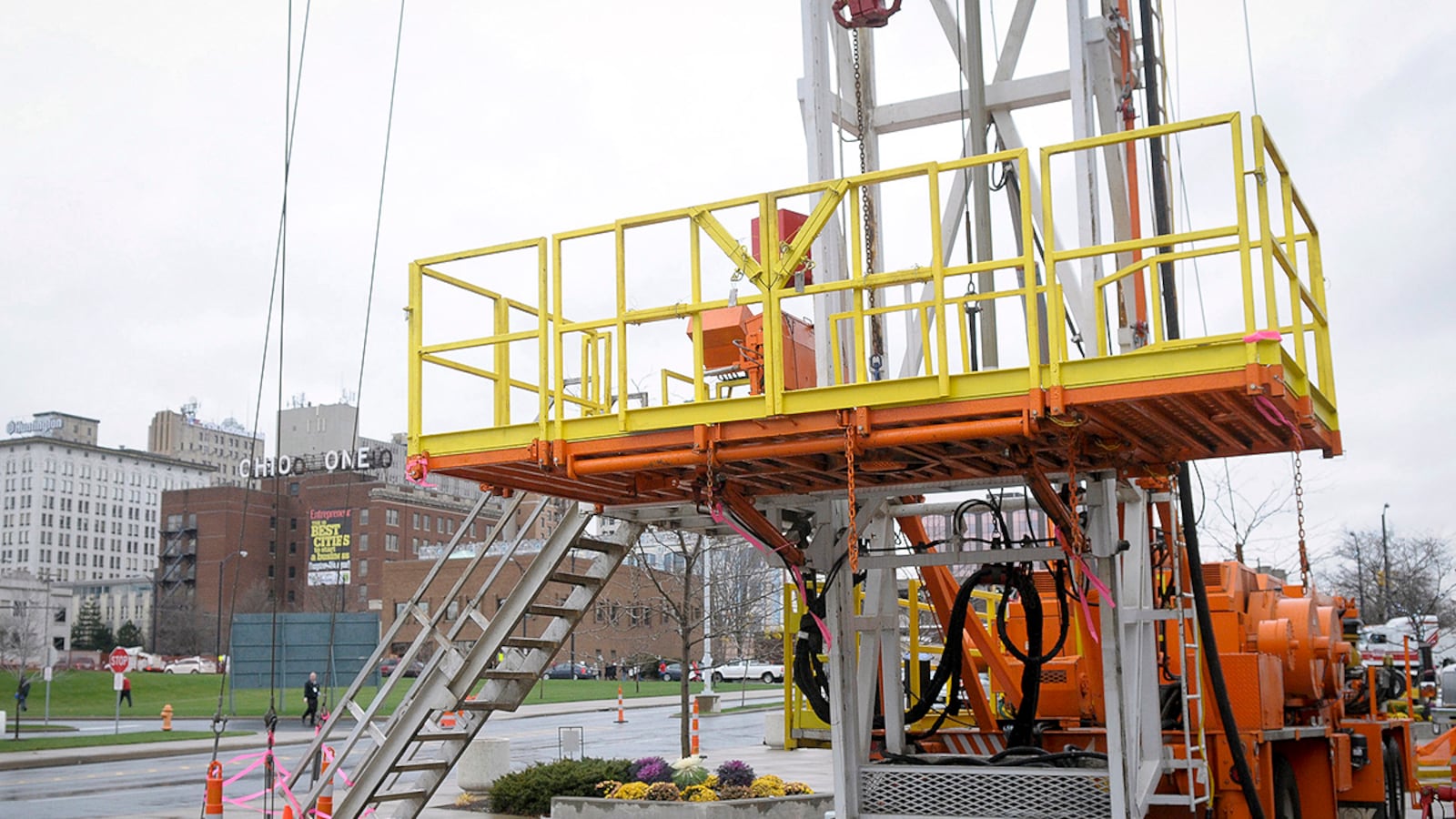Youngstown, Ohio, had its 11th earthquake since St. Patrick’s Day on New Year’s Eve—a magnitude-4.0 on the Richter Scale, the highest to date.
My wife and I were in town visiting my 96-year-old grandmother and felt the mid-afternoon rattle shake the roof for five to 10 seconds.
What makes the minor rumble newsworthy is that until 2011, Youngstown had never had a recorded earthquake.
What changed? Fracking.
"Fracking" is shorthand for the practice of hydraulic fracturing, a process of extricating natural gas embedded in underground shale rock. Pumping high-pressure fluids into the rock causes fractures, which makes extracting the fossil fuels more efficient. The technique turned what had been out-of-reach reserves that companies couldn't make a profit from extracting, into an abundant new energy source located here in America. It has come under increasing scrutiny amid environmental and health concerns, which have run into conflict with the desires of businesses and the needs of mayors and governors looking to supplement cash-strapped coffers. It is one of the most promising and controversial energy and environmental issues of our time.

In response to a Christmas Eve earthquake—the 10th in nine months—the Ohio Department of Natural Resources ordered D&L Energy Inc. to stop its operations at a brine-injection well in the heart of downtown Youngstown.
The epicenter of the New Year’s Day quake was within half mile of the 9,000-foot-deep well. All of the earthquakes emanated from within five miles of local drilling, and in some cases as close as a few thousand feet. The Ohio Department of Natural Resources is careful to state that there is no proven link between the drilling and the quakes, but the cause and effect seems clear to citizens.
The quakes are a new reason for caution in the increasingly contentious battles over fracking, which has pitted environmental concerns against economic ones at a time—and in a region—where new jobs are badly needed. Not incidentally, the area will be a major battleground of the 2012 presidential elections, bridging two crucial swing states.
Fracking has been a financial boost for the entire Alleghany region. The Marcellus Shale formation, which stretches from western New York State through Pennsylvania and eastern Ohio, has set off a regional jobs bonanza whose potential is only beginning to be felt.
Pittsburgh, one hour to the east in Pennsylvania, has seen its local economy boom due to the shale-gas exploration in neighboring counties. The steel-town’s office-vacancy rate is among the lowest in the nation. Given the rough recent economic history of the region, this bit of good news is also big news, definitively counter-cyclical at a time when the nation’s economy is still struggling for stability.
In 2010, the natural-gas industry triggered $11.2 billion in economic activity in Pennsylvania and 140,000 jobs, including over a billion dollars in state and local taxes, according to Pittsburgh Mayor Luke Ravenstahl.
"This is more than just drilling and extracting," Ravenstahl told me. "There are opportunities up and down the supply chain."
“From my perspective, the folks that have environmental concern are legitimate, and in some cases I share their concerns,” Ravenstahl continued. “The Marcellus Shale and the energy opportunities that exist here [are] tremendous. I think that most folks don't appreciate the potential for growth or the estimates for the shale itself could produce about approximately a quarter of America's natural gas by 2020. That’s incredible…It’s a whole new industry that is going to create jobs.”
The comparatively small exploration in eastern Ohio has already created hundreds of jobs in the proud and once prosperous steel-mill mecca of Youngstown, where my mother was born and raised, perhaps best known in recent years for inspiring a downtrodden Bruce Springsteen song. If environmental activists are blamed for blocking new jobs, it could reinforce reputations for being out of touch with many blue-collar men and women. But repeated earthquakes just get the attention of those workers.
There are precedents for these types of man-triggered, if not man-made, earthquakes—from incidents outside Denver in the 1960s to seismic events around Ashtabula, Ohio, in 2001. Nonetheless, Ben Lupo, the owner and CEO of D&L, describes the Youngstown earthquakes and subsequent state order to backfill the bottom of the brine well “a very freak accident…the first of its kind.”
"I don't like the turn-a-blind-eye approach that doesn't accept that this type of trigger is possible," Professor Leonardo Seeber of Columbia University’s Lamont-Doherty Earth Observatory told the Pittsburgh Post Gazette. "We need to acknowledge that as we increase fracking on the Appalachian Plateau in Pennsylvania and Ohio that we are doing the kind of waste disposal that is increasing the probability of seismic activity around these waste-injection wells."
The Youngstown Vindicator named 2011 the “Year of the Earthquakes” in Mahoning County. It’s far from clear that the seismic upheaval will be limited to the past calendar year—there can be unintended consequences to monkeying around with Mother Earth that must be taken into consideration alongside the potentially transformative economic upside. As with most debates and decisions in civic life, there is a balance to be struck.
The “wise use” school of conservation embraced by Theodore Roosevelt understood that land could be used for energy extraction but that material benefit had to be balanced against the generational responsibility of not handing our children and grandchildren a significantly lesser natural legacy than was handed to us. Shale Gas can be a well-deserved bonanza for a region that has been hard-pressed for good economic news since the 1970s. But these unprecedented earthquakes are also a wake-up call that cannot be wisely ignored.






